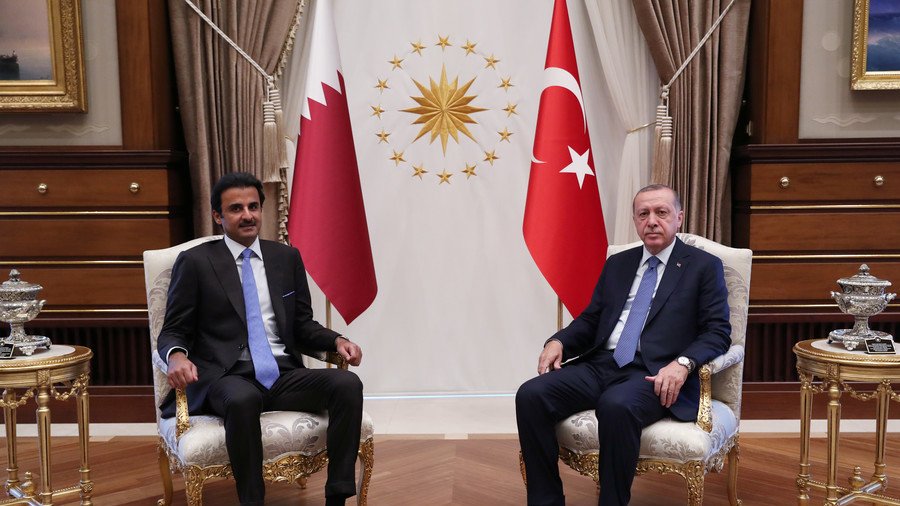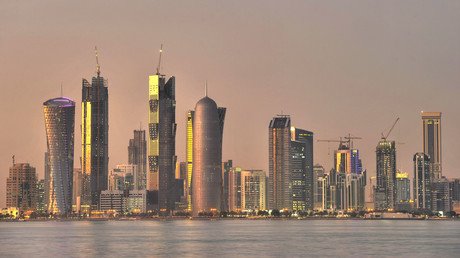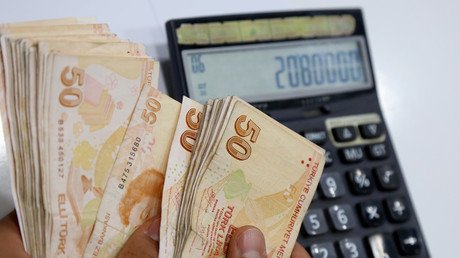Turkey & Qatar are being punished for refusing to do Washington’s bidding on Iran

For years, Turkey and Qatar were at the vanguard of the Western imperial project in the Middle East. Having had their fingers burnt in Syria, however, they’re refusing to facilitate Washington’s Iran plans – and paying the price.
Trump’s visit to Saudi Arabia in May last year – his first foreign trip as president – was significant for two main reasons: first, the $110 billion arms deal it produced, and secondly, the regional blockade of Qatar it heralded. This was widely seen as having been greenlighted by Trump during his visit. The impact of the blockade – implemented by Saudi Arabia, the UAE, Bahrain and Egypt – was, however, immediately mitigated by increased trade with Iran and Turkey in particular, limiting its overall impact.
This month’s attack on the Turkish economy, however, has had far more devastating results. Trump’s tweet on August 10 – announcing a doubling of steel and aluminum tariffs on an economy already hit hard by his trade war – sent the Turkish currency into freefall. By the end of the day’s trading, it had lost 16 percent of its value, reaching a nadir of 7.2 to the dollar two days later; before his tweet, it had never fallen below six to the dollar. Trump’s move came on the back of Federal Reserve policies that were already threatening to provoke financial crises in over-indebted emerging markets such as Turkey. These are harsh punishments for countries long considered prime US allies in the region.
I have just authorized a doubling of Tariffs on Steel and Aluminum with respect to Turkey as their currency, the Turkish Lira, slides rapidly downward against our very strong Dollar! Aluminum will now be 20% and Steel 50%. Our relations with Turkey are not good at this time!
— Donald J. Trump (@realDonaldTrump) August 10, 2018
A NATO member since 1952 (following Turkish involvement in the Korean war on the side of the US), Turkey has hosted a major US airbase at Incirlik since 1954. This has been essential to US operations in the region, and even housed the US nuclear missiles which triggered the Cuban missile crisis. Incirlik was crucial to the US-UK bombing of Iraq in 1991, and, although the Turkish parliament narrowly prevented its use for the 2003 redux, Turkey has been the launchpad for subsequent US strikes both in Iraq and in Afghanistan.
Qatar, meanwhile, is, to this day, run by the family – the al-Thanis – appointed as Britain’s proxies in the 19th century. Granted formal independence only in 1971, the country has remained deeply tied into Western foreign policy since then. Both its ‘post-independence’ rulers were educated at the UK’s Sandhurst military academy, and it, like Turkey, hosts a major US base, while its ruling family, like those of the other Gulf monarchies, are dependent on Western arms transfers to maintain their power. In 2011, Qatar played a major role in NATO’s Libya operation, providing airstrikes, military training, $400 million of funding to insurgent groups, and even ground forces – not to mention the major propaganda role played by the Qatari-owned network Al Jazeera.
Then, in mid-2011, both countries threw themselves headlong into the war to overthrow the Syrian government. Turkish President Erdogan had previously enjoyed relatively warm relations with his Southern neighbor, but at some stage decided that the Western-backed rebellion was going to win, and he wanted in on it. Turkey’s collaboration was crucial for the London-Washington Syria project, not only to give it a semblance of regional legitimacy, but more importantly because its 800km border with the country was to be the conduit for the tens of thousands of armed fighters on which the insurgency would depend.
Unwilling – and, following the decimation of their armies in Iraq and Afghanistan, probably unable – to provide the ground forces necessary to destroy the Syrian Arab Army themselves, the ‘regime-change regimes’ of the West relied on states like Qatar and Turkey to act as intermediaries to facilitate weapons transfers, provide finance and smooth the passage of foreign fighters. Both states, heady with the prospects of the economic and geopolitical rewards that would follow Assad’s removal, and believing their own networks’ fantasies about an imminent collapse, were more than happy to act as accomplices. Over the years that followed, the resources they committed – and the devastation that resulted – were immense. In the case of Turkey, in particular, the spillover would prove disastrous.
Less than three years into the war, the International Crisis Group estimated that Turkey had spent $3 billion on the war on Syria. Yet this figure, high as it is, represents a fraction of the true costs involved. A detailed report in Newsweek in 2015 noted the huge increase in military spending following the start of the Syrian war, rising from $17 billion per year in 2010, to $22.6 billion in 2014, an increase of 25 percent. Furthermore, Turkey has been the first port of call for millions of Syrians fleeing the war. This alone had cost the country an estimated $8 billion by 2015.
Added to this, the report says, are the ‘collateral costs’ resulting from the deterioration of relations with Russia following Turkey’s downing of a Russian jet in 2015, which it estimated could be as high as $3.7 billion due to lost Russian tourism, investment and trade. Trade with Syria, of course, also slumped by “70 percent as a direct effect from the Syrian war,” from $1.8 billion worth of exports in 2010 to $497 million two years later. In place of this legitimate trade – much of it in energy resources – however, came a flourishing new illicit trade. This new trade imposed “an additional cost to the Turkish economy: a growing, untaxed, hard-to-control black market economy. To combat its effect on government revenue, Turkey’s Energy Market Regulatory Agency declared an increase in inspections and control mechanisms in Turkey.”
Ultimately, however, the government opted to facilitate, rather than attempt to control, this burgeoning black market, issuing in April 2015 “new border regulations that enabled Turkey to open its borders to uncontrolled cash inflow and remittances. According to the new law, travelers no longer had to declare transported currency or profit amounts at the customs booth.” This policy would, noted former governor of Turkey’s central bank Durmus Yilmaz, “attract black money to flow into Turkey.”
“In sum,” concluded the report, “as Turkey incrementally left its prior foreign policy agenda of “Zero Problems with Neighbors” and moved towards an Assad-centric policy, the costs imposed on its economy multiplied. This can be observed directly from the refugee costs, military spending, border security costs and the changing composition of trade volume and quality of liquidity flows in the economy.” Furthermore, “The data suggest… that the more aggressive Turkey gets in its Syria policy in terms of military involvement, the more aggressively these costs rise.” Erdogan’s enthusiastic collaboration with the regime-changers in Washington and London had crippled his country’s economy – not to mention spawning a new era of sectarian militancy in the form of ISIS, which would launch multiple terrorist attacks within Turkey itself.
Being far removed from the conflict, the Syrian war’s impact on Qatar was not nearly as severe. Nevertheless, Qatar, too, pumped billions into the insurgency. The Financial Times noted in 2013: “The gas-rich state of Qatar has spent as much as $3 billion over the past two years supporting the rebellion in Syria, far exceeding any other government.” It added that “Qatar has sent the most weapons deliveries to Syria, with more than 70 military cargo flights into neighboring Turkey between April 2012 and March this year,” showing clearly the division of labor between Qatari finance and Turkish logistics.
Turkey and Qatar have thus put themselves right at the forefront of Western efforts to overthrow the Syrian state. To date, however – other than an ever-growing pile of burnt Syrian corpses and a huge hole in their own finances – they have nothing to show for it.
In hindsight, the Turkish downing of a Russian jet in November 2015 can be seen as a last-ditch attempt to test the resolve, not of Russia, but of the West. Erdogan wanted to know whether or not the US was going to put their money where their mouth was and put some decisive muscle into the conflict. In the escalation that followed the attack, Turkey immediately put forward plans for a ‘no fly zone’ – euphemism for the sort of all-out aerial bombardment that befell Libya.
But nothing came of it. That was the moment Turkey realized the West was not about to commit anything like the resources necessary to actually bring about victory. Assad was here to stay. Turkey would have to deal with that. And that meant dealing with Russia. The slow realignment of Turkish foreign policy had begun. And earlier this year, with tails no doubt firmly between their legs, even Qatar re-established relations with the Syrian government.
So, when Trump came knocking for buyers for the West’s next brilliant idea – war on Iran, beginning with a brutal economic siege – neither Turkey nor Qatar were exactly chomping at the bit to sign up. The suggestion was even less appealing than the disastrous Syrian gambit, targeting an even more important trading partner, and with even less chance of influence over some mythical future government.
Qatar shares a major gas field – South Pars – with Iran, and is dependent on Iran for accessing eastern energy markets, while Iran is the major source of Turkish energy imports. Following Syria, neither country has much nose left to cut off, even if they had wanted to spite their own face. Trump’s merciless attack on their economies is yet another sign of the increasing US inability to bend once-pliable clients to its will. For all his bluster, it is a clear admission of weakness and failure.
Think your friends would be interested? Share this story!
The statements, views and opinions expressed in this column are solely those of the author and do not necessarily represent those of RT.


















